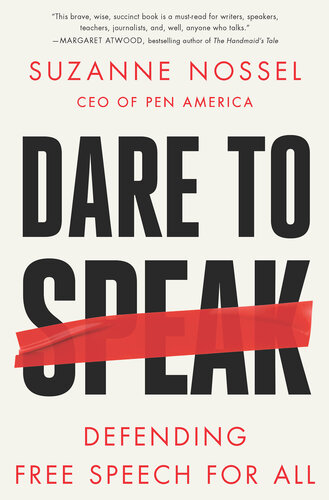
Dare to Speak
Defending Free Speech for All
کتاب های مرتبط
- اطلاعات
- نقد و بررسی
- دیدگاه کاربران
نقد و بررسی

February 24, 2020
Nossel, CEO of PEN America, debuts with a reasoned, well-sourced argument for protecting free speech, even in cases where it’s morally reprehensible. She contends that “informal self-governance” is preferable to enacting bans on offensive speech, and laments “the decoupling of speech from considerations of intent and context.” To combat hate speech, Nossel advocates respectful “counterspeech” rather than furious tirades or “speech-suppressive strategies.” She notes that free speech as a political issue has gone from a liberal priority to a conservative crusade in recent years, and provides data suggesting that millennials are more in favor of censoring speech in order to protect minorities than previous generations. To help counter this “troubling tendency,” Nossel commends progressive talk show host Bill Maher and President Barack Obama for defending the speech rights of those with whom they disagree. She criticizes the influence of “call-out” culture and offers guidelines on how to tell the difference between real and pseudo apologies. Some of Nossel’s suggestions for defusing offensive speech seem overly optimistic, but her ardent defense of this constitutional right is based persuasively on personal experience and straightforward evidence. Readers will find this clearheaded account to be a helpful guide to navigating today’s partisan extremism.

March 15, 2020
The CEO of PEN America suggests how to protect free speech in a digital age. As Nossel notes in her debut book, Herbert Marcuse argued that "creating a broadly tolerant society demands intolerance of certain ideas, including right-wing ideologies." With far-right extremism on the rise, his view is making a comeback, writes the author, and she rebuts it in a defense of free speech that alternately hits the mark and wanders far afield from First Amendment issues, dealing instead with cultural insensitivity or noninclusive language. In much of the first half, Nossel serves up unedifying bromides on how to respond to "unintended offenses" such as stereotyping millennials as "snowflakes" or "asking a fellow party guest if she's pregnant when she isn't." The narrative gains traction when the author addresses urgent questions such as how to protect free speech while responding effectively to harmful material like online revenge porn, terrorist recruitment, and deepfake videos. Nossel, who has also served as the COO of Human Rights Watch, shows in chilling detail how tech companies are failing to moderate content appropriately. Google and Facebook, for example, "demote problematic posts, limiting how often they are seen without excising them entirely," or "shadow ban" them by "suppressing social media users so that, unbeknownst to them, their posts and content cannot be seen by others." The social media giants must become more transparent, argues Nossel, partly by notifying users promptly if they face sanctions. Throughout the book, the author argues persuasively that "informal self-governance" protects free speech better than corporate or government restrictions, but after reading her accounts of abuses by Silicon Valley behemoths, few readers are likely to disagree with one of her conclusions: "Mandated transparency is one area where government regulation of online content may be a positive step and would not entail intrusions on content in violation of the First Amendment." Apt and inapt arguments commingle in a passionate defense of free speech.
COPYRIGHT(2020) Kirkus Reviews, ALL RIGHTS RESERVED.

April 1, 2020
Nossel, CEO of PEN America, has written a book for anyone who communicates online or in print and wants to retain "free speech" while acknowledging boundaries, maintaining empathy, and respecting the complexity of identities, especially when exploring or discovering how different political and social groups explore the flexibility and mutability of language online. Nossel carefully and thoughtfully outlines principles for speaking, listening, and debating free speech, beginning with a valuable compendium of legal and policy-related considerations. Beyond those fundamental elements, she repeatedly invokes empathy as a necessary component of all aspects of free speech, from what we say to how we respond, along with how to consider the ethics of protest, silencing, and intervention. The book provides clear, actionable steps and examples that range from individual/personal to large-scale and legal, which makes it at once accessible and informational. Each chapter ends with a how-to guide, which, while useful, may seem a little too straightforward for practices as changeable and varied as those she describes (such as misappropriations, contextually inappropriate word choices, and audience-specific nuances). VERDICT An informative work for readers interested in human rights, free speech, censorship, and how they interact. [See Prepub Alert, 10/21/19.]--Emily Bowles, Univ. of Wisconsin, Madison
Copyright 2020 Library Journal, LLC Used with permission.

December 1, 2019
CEO of PEN America, Nossel daily addresses issues of free speech in a world fraught with online trolls, fascist chat groups, campus-speaker fights, and the issue of hate speech vs. censorship. Here she explains how we can balance the right to speak one's mind and the right of equal treatment in a still tragically unequal world. With a 100,000-copy first printing.
Copyright 2019 Library Journal, LLC Used with permission.

























دیدگاه کاربران